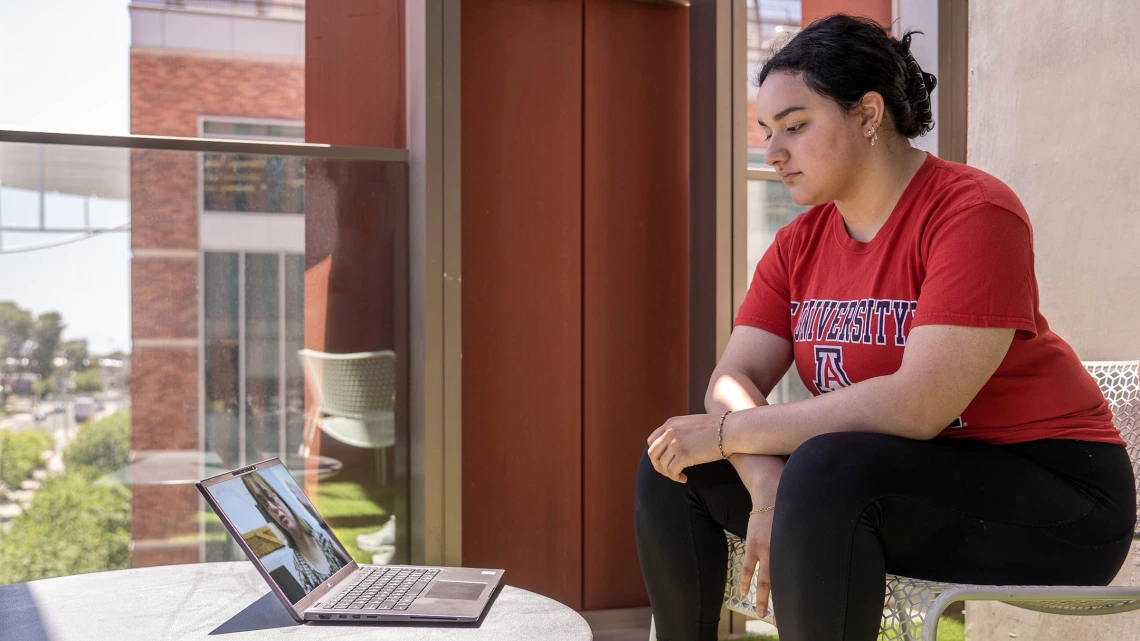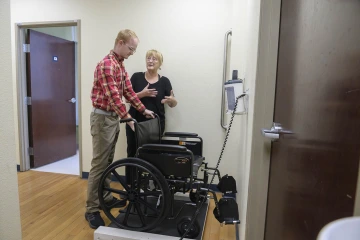Sonoran Center trains students to close disability care gaps
Disability-centered education training opportunities prepare students from the Health Sciences and other disciplines to provide patient-centered care.

The Sonoran Center for Excellence in Disabilities, along with the Center for Transformative Interprofessional Healthcare, utilize a virtual Interprofessional Education Event on Disability, to ready Health Sciences students to care for patients with intellectual and developmental disabilities. This includes videos about a woman with Down syndrome and diabetes who is going through a change in her living situation.
Most people receive care from a variety of health professionals throughout their lives, including doctors, nurses, pharmacists, dietitians, people who run public health programs, and more. Unfortunately, not all of these professionals have experience providing care to people with disabilities.
The Sonoran Center for Excellence in Disabilities in the Department of Family & Community Medicine in the College of Medicine – Tucson works to ensure that future health care providers are prepared for some of the unique challenges they may face.
“People with intellectual and developmental disabilities are suffering from health care disparities in our country and in the state,” said Tamsen Bassford, MD, an associate professor of family and community medicine in the College of Medicine – Tucson.
“We know from national studies that the majority of health care students and professionals are not getting significant, or even small amounts of training on developmental medicine or disability-centered education in medical school and in residency. We also know that early exposure to people with disabilities for health care professionals leads to better attitudes, more willingness and enthusiasm for caring for people with disabilities,” she said.
Comprehensive care with compassion

Tamsen Bassford, MD, shows fourth-year medical student Steven Willden how to use a wheelchair scale in clinic.
To make this goal a reality, Dr. Bassford has worked closely with the Sonoran Center as an investigator since it was established in 2006. The Sonoran Center is one of Arizona’s two University Center for Excellence in Developmental Disabilities. Each state has at least one UCEDD to serve as a resource in education, research and service for people with IDDs.
“Gaining experience with disability broadens students’ knowledge of diverse and underserved populations, better preparing them as the next generation of professionals who will interact and engage with people with disabilities as colleagues, patients and collaborators,” said Wendy Parent-Johnson, PhD, executive director of the Sonoran Center and professor in Family and Community Medicine.
In order to prepare future doctors and other health professionals to provide quality care to people with disabilities, the Sonoran Center and Dr. Bassford, the five UArizona Health Sciences colleges and the UArizona Center for Transformative Interprofessional Healthcare, offer various training opportunities to students and medical residents.
Interprofessional Education Event on Disability
When providing care for someone with an IDD, some common mistakes made by health professionals include talking to the patient’s family member, caregiver or assistant instead of the patient; not listening to the patient’s opinion about their own illness; assuming the patient isn’t able to do certain things; or making erroneous assumptions about a patient’s mental capacity.
This is the gap the Interprofessional Education Event on Disability has been trying to fill since it first began in 2007. The event brings together community members with a variety of disabilities, UArizona Health Sciences faculty and students as well as students from other programs.
Facilitated by Dr. Bassford, supported by the Sonoran Center and organized by the Center for Transformative Interprofessional Healthcare, the event is part of a series of interprofessional education events for students that aim to prepare them as health professionals for team-based, patient-centered care.

Wendy Parent-Johnson, PhD, executive director of the Sonoran Center and professor in Family and Community Medicine.
When the event switched from in-person to Zoom in 2021 due to the COVID-19 pandemic, it was a blessing in disguise, Dr. Bassford said. “Zoom was the easiest and best way for the students and community members to participate,” she said.
The move to virtual also accommodated more learners from outside the UArizona. Margie Arnett, director of the Center for Transformative Interprofessional Healthcare, and Lynne Tomasa, PhD, MSW, assistant professor of family and community medicine, said there were 254 in-person UArizona learners at the inaugural session. In 2021, the year the event went virtual, there were 521 learners from UArizona, Arizona State University and Northern Arizona University. By 2023, the number rose to 722 UArizona, ASU and NAU learners.
The health care team for a person with a disability is made up of more than just medical doctors, therefore interprofessional training is important to ensure students and future professionals from other fields have the knowledge and ability to provide person-centered care to their clients with disabilities. Over the years, this event has attracted both undergraduate and graduate students from audiology, speech pathology, law, social work, dietetics and athletic training.
“Everything in medicine and education is a team sport,” said Dr. Bassford.
Medical student training
Fourth-year medical students have the option to gain first-hand experience participating in the care of individuals with IDDs in an elective course taught by Dr. Bassford.
The course teaches students about a broad range of neurodevelopmental disorders including their co-morbidities and functional impairments, familiarizes students with the medical and behavioral features of common neurodevelopmental disorders, and informs students about key support and service issues and medical terminology relevant to the field of developmental medicine.
“I enrolled in the course because prior to starting medical school I worked as a behavioral specialist for children with IDDs,” said Lucas Oliviera, a fourth-year College of Medicine – Tucson student currently taking the course. “During that time, I learned from the parents of the children I worked with that they struggled with receiving proper care and would drive hours to see dentists and physicians that would see their loved one and provide adequate and compassionate care. I realized then that as a future health care provider I had a responsibility to seek out opportunities to learn how to best care for this population. Dr. Bassford offered just that with this course.”
Family medicine residency training
Built into the family medicine residency curriculum is developmental medicine training.
Residents receive lectures on health care for people with IDD throughout their three-year curriculum, see patients with IDDs in the outpatient clinical setting at Banner – University Medical Center South and the Banner – University Medicine Family Medicine Clinic at Alvernon, and second- and third-year residents go on home visits with Dr. Bassford. The home visits “are always a very significant experience for the residents,” she said.
A person-centered approach
“Everything in medicine and education is a team sport.”
Tamsen Bassford, MD
One commonality these trainings have is their person-centered approach. Community members with disabilities are given a platform to share their experiences navigating the health care system in the IPE event. Their candid perspectives allow future health care and other professionals to better understand their impact and why it is important to provide competent and compassionate care to people with IDDs. In Dr. Bassford’s medical student class and family medicine residency training, individuals with IDDs are taught to be viewed as more than just a patient, but as a whole person, leading a full life.
“Students who have the opportunity to engage people with disabilities, not just as their patient, but as their teacher, gain personal knowledge of the rich diversity of this population. As a result, their overall practice as health care professionals is deepened in the process,” said Dr. Parent-Johnson.

